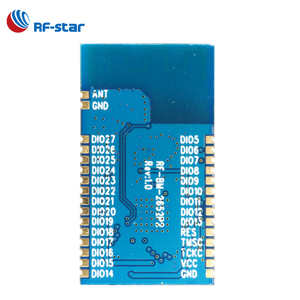Zigbee Transceiver Module: An Overview
The Zigbee transceiver module is a critical component in the realm of wireless communication technology, primarily designed for low-power, long-range communication in a variety of applications. Zigbee technology is known for its robustness, enabling devices to form a mesh network, enhancing connectivity and reliability. This module facilitates seamless data transmission between devices in a wide range of scenarios, ensuring an efficient exchange of information while consuming minimal power.
Types of Zigbee Transceiver Modules
There are various types of Zigbee transceiver modules available, each suited for specific applications and design requirements. The primary types include:
- Chip-Integrated Modules: These are compact and integrated modules that include a microcontroller along with the Zigbee transceiver, perfect for space-constrained projects.
- RF Modules: These are standalone radio frequency transceivers designed specifically for long-range applications, facilitating greater distances between devices.
- Evaluation Boards: Primarily used for prototyping and development, evaluation boards offer a straightforward platform for testing the capabilities of Zigbee transceivers.
- Development Kits: They provide engineers and developers with an entire package to create and test Zigbee applications swiftly, including software tools and documentation.
Applications of Zigbee Transceiver Modules
The flexibility of Zigbee transceiver modules allows them to be utilized across a multitude of industries and applications, such as:
- Smart Home Automation: Zigbee modules are widely used in smart home devices, enabling lights, thermostats, and security systems to communicate effectively.
- Industrial Automation: In manufacturing settings, these modules connect sensors and machines, allowing for real-time monitoring and improved operational efficiency.
- Healthcare Monitoring: Zigbee transceivers facilitate remote patient monitoring systems, allowing medical professionals to track patient vitals without being physically present.
- Agricultural Monitoring: Farmers utilize Zigbee to monitor soil moisture levels and climate conditions, optimizing resource efficiency and crop yields.
Advantages of Using Zigbee Transceiver Modules
Employing Zigbee transceiver modules in your application presents numerous advantages, making them a preferred choice for many developers:
- Low Power Consumption: Zigbee technology is designed for low energy usage, making it ideal for battery-powered devices that require long usage life.
- Robust Mesh Networking: It supports a mesh network topology, enhancing communication reliability since multiple paths exist for data transmission.
- Interoperability: Zigbee modules are compatible with various devices and systems, promoting a unified smart ecosystem.
- Scalability: Systems built with Zigbee can easily expand by adding more devices without significant changes to infrastructure.



















































































































































































